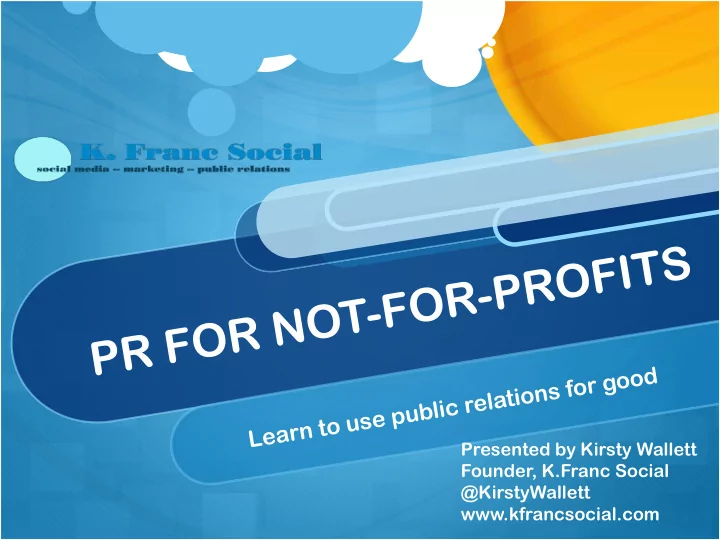

Presented by Kirsty Wallett Founder, K.Franc Social @KirstyWallett www.kfrancsocial.com
Hello! Public Relations It gets a bad wrap sometimes But it’s an amazing tool for your charity or not-for-profit
Today’s objectives Develop the basics of a successful public relations strategy for your organisation Harness media coverage to get your brand in front of donors & the public Practical tips on how to deal with the media & manage PR within your organisation Learn what makes a ‘news-worthy’ event & media release
Planning = success It’s not all about writing media releases & getting time on TV. You need to know why your organisation is investing in PR
Keep it simple Don’t spend all your precious time planning! Strategy THEN tactics Strategy THE BIGGER PICTURE THE PLANNING & THE WHY Tactics THE DOING THE DETAILS
Strategy basics WHY Why will PR or media coverage benefit your organisation’s campaign or event? HOW You do need to resource PR on an ongoing basis WHAT What will you say? And more to the point, what will you say to stand out from the crowd?
Breaking it down THE WHY Why are you using PR? Could another form of promotion (marketing etc) be more effective? Is PR the best way to promote your organisation’s work? i.e. does your work lend itself easily to media coverage?
Breaking it down THE HOW How will you resource your PR? You will need: - A spokesperson ‘someone to speak to the media’ - A liaison – someone to field media enquiries - Time - it takes skill to write a media release
Before you get started… Set the foundations for good PR practice
PR foundations KEY MESSAGES • What are the most important points your organisation needs to say? • Break it down and make it simple • Share & educate within your organisation
Key messages
Media spokesperson WHO WILL SPEAK FOR YOUR ORGANISATION? They need to: • • be comfortable with speaking to media & be well spoken (or undergo media training) • Have a thorough knowledge of the organisation & key messages • Make media interviews a priority (time, availability etc)
Media policy An internal guide for staff ensures successful PR • One point for media enquiries • Approval process for media interviews • Discourages media interviews with unauthorised staff that may be ‘off-message’ • Avoids multiple staff contacting same media orgs (looks unprofessional & is waste of everyone’s time!)
Media contacts Research, research, research! • Know your local media – TV, radio, newspaper • Contact them and ASK how they prefer to get story details (email/phone) • Keep details up-to-date • Tailor content to each media org – i.e. what works for radio may not work for print.
Newsworthiness WHAT M T MAKES A ES A STORY W Y WORTH TH O OF MEDIA COVER ERAGE? E? Timelin lines ess – a new announcement, a new event, a current event • (with another of the below), an event based around a calendar date i.e. mother’s day Award/ d/achi hieveme ment nt/br breakthrou ough gh - a new honour, award, significant • funding, exciting research findings Drama o or conflic lict – a rescue, accident, story of triumph over • illness/adversity Celebrit ity e endorsemen ent/in involvemen ent – ambassadors etc • **The he l launc nch h of a a new d dono onor campa paign gn o or m marketing ng c campa mpaign gn is NOT T news wsworthy in in it itself!
Media release example
Media release example
Media release tips Ensure you have a strong news angle Use a short sharp headline Keep sentences short Do not ‘ bury the lead ’ start with the most important part first. Always include quotes from an org spokesperson (or two but never more)
Media liaison tips Always contact journalists individually, if time allows Always tailor media releases to the local area Do not call at news times for radio and TV Learn news deadlines – days and times - ask!
Wrap up You should now be able to: Know if you have the resources to start utilising PR or your organisation Build a sound & simple PR media strategy for your organisation, or refresh your strategy Start developing or improving media contacts Know what makes a ‘newsworthy’ & successful media release
Q and A time SAY HELLO! Kirsty Wallett Kirsty@kfrancsocial.com www.kfrancsocial.com @Kirstywallett (Twitter)
Recommend
More recommend